nakedcapitalism | “Jury Instructions & Charges” (PDF) [Judge Juan Merchan, New York State Unified Court System]. Merchan’s instructions are 55 pages long. Apparently, Merchan isn’t allowed to give the jury a copy (hence their request to have them read aloud to them again). In any case, Merchan’s instructions are not devoid of interest. Let me start with an epigraph:
“The Law is the true embodiment. Of everything that’s excellent. It has no kind of fault or flaw. And I, my Lords, embody the Law” –Gilbert and Sullivan, Iolanthe
I’m reminded of G&S by this passage from the transcript. Merchan before he launches his Instructions:
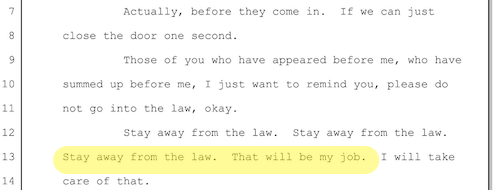
I am, however, not necessarily being fair to Merchan. He consistently uses the word “our law,” which could imply the majestic principle that the law applies to and is for the benefit of all of us, or should do so. On the other hand, Merchan could also be using “our law” exactly as liberal Democrats use “our democracy.” Given lawfare, the latter may be more likely.
Now let me move to some extracts, helpfully annotated. A technical matter, page 22:
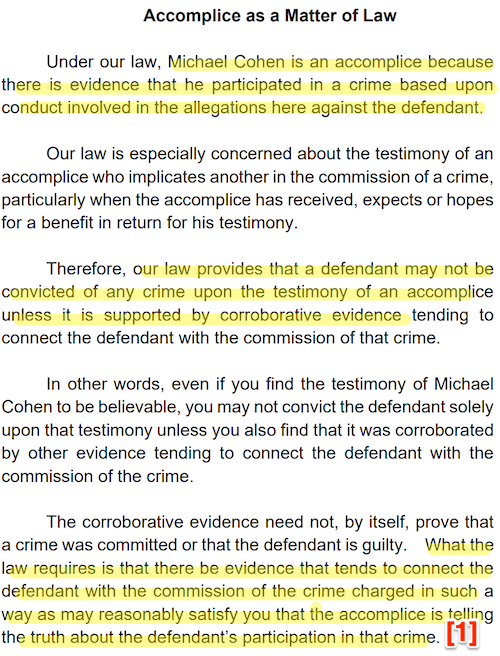
[1] Merchan quotes from the Guide to New York Evidence, 6.10. I have to assume that with enough time, I could come up with similar boilerplate for all the instructions.
On “Accessorial Liability,” p. 25:
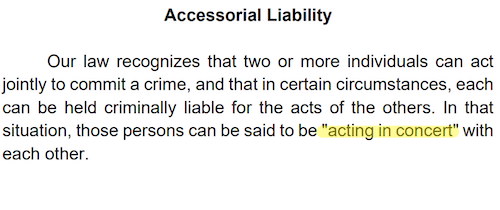
And:

[1] To this layperson, this notion of “unanimity” since strange (“I don’t care who broke the vase or who hid the pieces”), though I’m sure it comes from somewhere in the Guide. But certainly “acting in concert” maximizes the paths to conviction (not that I would expect a good, or at least an effective, prosecutor to do anything else).
On “Intent to Defraud,” p. 29 (as I understand it MR SUBLIMINAL Hollow laughter, the “intent to defraud” applies to the business records, and not to the “other crime”):
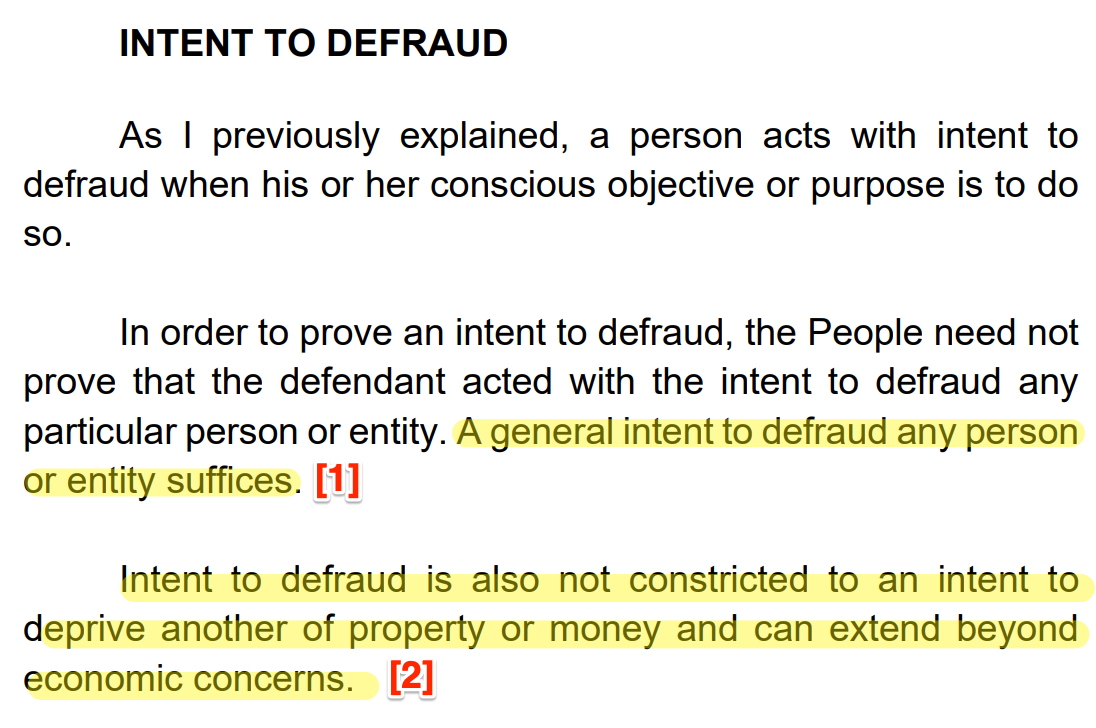
[1] As, for example, a candidate’s misrepresentations in an election. Ideal for the Censorship Industrial Complex, when you think about it. Who would have thought five Pinocchios from Glenn Kessler could end up as a criminal offense?
[2] Underlining that “election interference” could theorized as fraud. (If true, this principle is certainly arbitrarily applied in the State of New York; RussiaGate, Clinton’s email server, and the suppression of Hunter Biden’s laptop could all be considered criminal.)
On “Intent to Commit or Conceal Another Crime” (this is the heart of the matter: the theory that bootstraps 34 business records misdemeanors into 34 felonies; the “other crime” (“object offense”) that the business records were falsified in aid of (if falsified they were), pp. 29 et seq.:
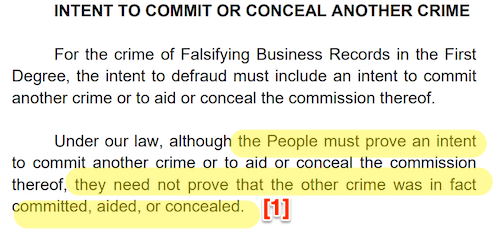
[1] Once again, the paths to conviction are maximized.
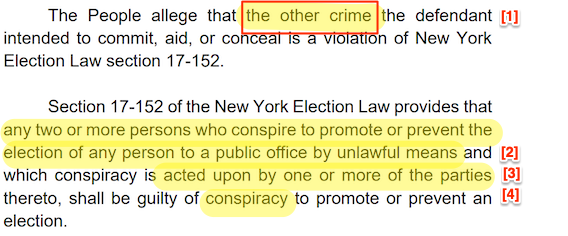
[1] As I showed here (early), the “object offense” did not appear in District Attorney Bragg’s charges, but evolved — with a great deal of puzzlement here and in the press generally — in the course of the trial, much assisted by Merchan in his pre-trial ruling (as I show here). To this layperson, it seems very much like the Defendant was not informed of the charges against him (SIxth Amendment: “to be informed of the nature and cause of the accusation“). Now, Bragg might argue that the Defendant was informed; the “accusation” was the business records violation, and the “other crimes” were merely icing on the cake, as it were. Perhaps “our law” is ambiguous in that regard. If so, the matter of whether converting misdemeanors into felonies requires “notice of accusation” may be settled in an appeal.
[2] “Promote or prevent” is the election interference part (and nothing in this case is distinguishable from normal campaigning, to my simple mind, and this includes business records stuff like the Clinton campaign laundering payment for the Steele dossier through Marc Elias’s highly reputable law firm).
[3] So some member of the alleged conspiracy must act, but not necessarily the Defendant, once again maximizing the paths to conviction.
[4] One question why the Defendant was never charged with conspiracy. This is the charge of conspiracy.
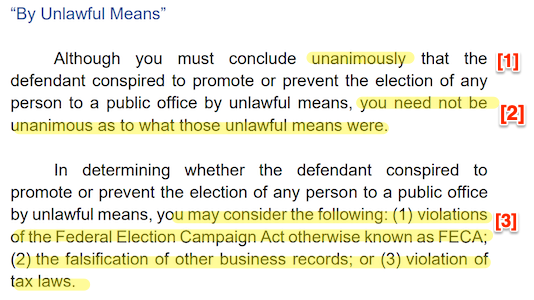
[1] This “Merchan’s Chinese Menu: One from Column A, one from Column B… The concept of “unanimity” seems to take on strange forms in Merchan’s court.
[2] Turley argues: Suppose there are three “unlawful means” (the object offenses) A, B, and C. A verdict where 4 jurors voted for A, 4 for B, and 4 for C would be treated as “unanimous”; to this layperson, an absurd result. But I think this argument can be made more pointed: The jurors who vote for A must necessarily believe that the Defendant is not guilty beyond reasonably doubt of offenses B and C, and so with the remaining jurors. So we could have a verdict where 12 jurors do not believe in the Defendants guilt beyond a reasonable doubt of any one object offense. That strikes me as a very bad precedent and worthy of consideration on appeal. From Thomas P Gallanis, “Reasonable Doubt and the History of the Criminal Trial,” The University of Chicago Law Review: “Reasonable doubt was originally a protection not for criminal defendants, but rather for the ‘souls of the jurors’ (p 3). Reasonable doubt was “designed to make conviction easier” by reassuring anxious jurors that they would not be damned for voting to spill the defendant’s blood (p 4 (emphasis omitted)). Jurors could safely convict as long as their hesitations did not rise to the level of reasonable doubt.” So what is the state of the individual juror’s soul when the entire jury votes to convict, but without unamimity as to the cause of the conviction?
[3] These are the the three “unlawful means” proposed by the Prosecution. I presume that “other” business records does not include any of the 34 business records in the charge, so I don’t think that item (2) is necessarily circular, or “loops back on itself,” in an infinite regress, but without clarification, it could mean that records 1-17 would fall under the business records offense, and records 18-34 could be redeployed as object offenses…. One wonders what form of “unanimity” would be required to sort this, if so (but see on “Falsification of Other Business Records” below):
On the first of the three unlawful means, “The Federal Election Campaign Act,” p. 32:

[1] Leaving aside the question of whether Federal laws should be enforced at the state level, and leaving aside Merchan’s curious refusal to let the defense expert on FECA testify, the obvious agenda here is to urge that NMI’s “catch and kill scheme,” which suppressed news stories, was not a “legitimate press function.” However, suppressing news stories is obviously a legitimate press function, and only a child of six would think otherwise (one thinks at once of The New York Times suppressing James Risen’s story on warrantless surveillance until after Bush was safely elected).
On the second, “Falsification of Other Business Records,” p. 33:
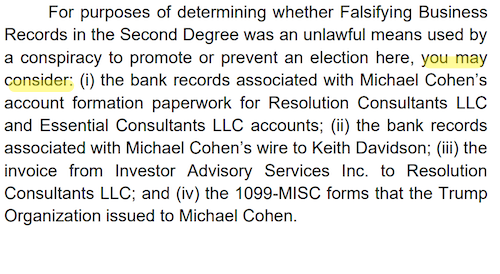
This closes out my theorizing on infinite regression in other records, above. Too bad! I haven’t mastered the detail on these documents, but Merchan’s specificity makes me think that this “object offense”) is the most dangerous to the Defendant. (Of course, I don’t believe there are object offenses, because iff the initial counts 1-34 all pertain to the payments for Cohen that are allegedly not for legal services, they in fact were, because to my simple mind. a legal service is something you pay a lawyer to do, and thus there is no primary offense to begin with.)
On the third, “Violation of Tax Laws,” p. 34:
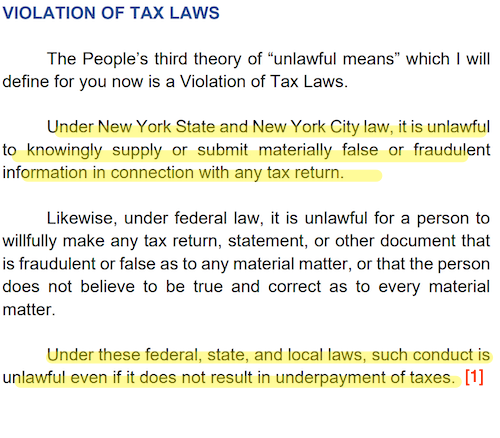
[1] If this is the only unlawful means, I can see at least one hold-out being unwilling to jacl up 34 misdemeanors to felonies based on it.
On “The Charged Crimes,” p 27:
“Verdict Sheet,” p. 53:
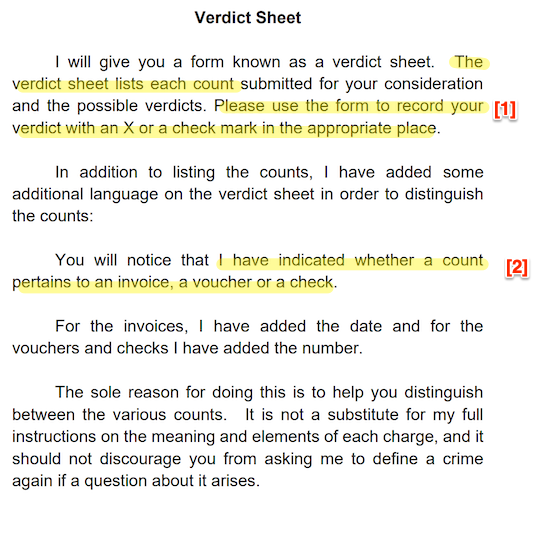
[1] These are the counts in Bragg’s indictment; each of the 34 counts is a separate business records offense.
[2] Notice the checkboxes that Merchan does not include:
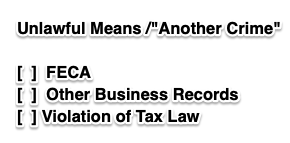
Surely the voting public has an interest in knowing which object offense caused Trump’s misdemeanors (if any) to be converted into felonies. An absurdly minor tax violation? The much bruited and salacious catch-and-kill scheme? A campaign finance violation? Merchan, apparently, has no care for the voters. I would speculate that — with the possible assistance of the flex-net working the lawfare on this project — having maximized the paths to conviction with capacious definitions of unanimity, Merchan would prefer not to “show his work,” and reveal how those definitions worked out in reality. Whether this is grounds for appeal I don’t know, but I find it appalling. “Our law”! “Our democracy”!


0 comments:
Post a Comment